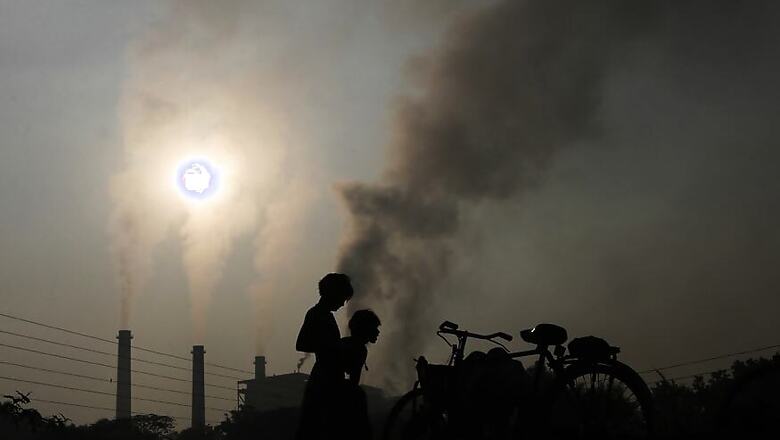
views
New Delhi: While we continue to blame stubble burning in the neighbouring states of Punjab and Haryana for pollution in Delhi, there are other factors that should be considered, like the environment ministry's failure at implementing pollution norms at thermal power plants across the nation.
Yet again, the Ministry of Environment and Forests (MoEF) is most likely to miss its deadline to implement the pollution norms at all thermal power plants for the third time this December. This comes even as the Delhi government is failing to come up with enough measures to curb the ‘severe’ levels of pollution in the Capital.
The environment ministry, in close consultation with Central Pollution Control Board (CPCB), had come out with a draft notification on December 7, 2015 for the implementation of stricter pollution mandate across all thermal power plants in India.
The original deadline for execution was December 2016, which was later extended to June 2017 and finally to December 2017. Experts are of the opinion that it will take 3 more years for power plants to comply with the norms.
The notification suggested a 40% reduction in emission of particulate matter and approximately a 30% reduction in water consumption.
“Implementing the 2015 pollution norm will take more time and industry bodies and stake-holders have expressed their difficulties in coming up with the required retrofit. The power ministry is also in close consultation with us regarding this. We are speaking to the Central Electricity Authority (CEA) for an extension of the deadline,” said an official from the environment ministry, requesting anonymity.
The norms require all thermal plants to become more water efficient and to reduce the pollution they spread in the atmosphere. These include the hazardous oxides of sulphur (SOx) and nitrogen (NOx), mercury and particulate matter.
To meet the new pollution norms for SOx, the plants are necessarily required to retrofit or install a technology called flue-gas desulfurisation or FGD, which helps remove sulphur dioxide from exhaust flue gases of coal-based power plants. Industry estimates suggest installing the FGD would cost about Rs 50-75 lakh per megawatt of plant capacity.
The Centre for Science and Environment (CSE) estimates that about 45% of the SOx pollution from the industrial sector comes from thermal power plants.
“Had the retrofit been in use by now, there would have been an 80% reduction in emission levels of sulphur, nitrous oxides and mercury,” said Rohit Pathania, Programme Manager, Centre for Science and Environment.
The new environmental regulations requiring the installation of this technology was supposed to be implemented in December 2017, at all existing thermal power plants except the units sanctioned to CEA before July 1, 1994. For the stressed thermal power sector, this meant cashing out of capital expenditure ranging Rs 50-75 lakh per megawatt in the least, say experts.
“Industries have expressed concerns regarding a lack of allocated space and funds,” explained an official from ministry of power.
Moreover, the ministry of environment is also facing a case before the National Green Tribunal. Petitioners have claimed that the ministry has not enforced the new regulations at several new thermal plants.
On the other hand, NTPC Ltd spokesperson said that their plants are not high emitters of pollutants. He did not reply to mails regarding the installation of FGD.
Meanwhile, the Delhi power ministry has also confirmed the delay.
Queries to ministry of environment and forest, ministry of power, Delhi state power ministry, NTPC, have been sent.
This delay in implementation gains further significance with the national capital engulfed in a thick smog and the air quality level going down to ‘severe’ levels. While crop-burning is the immediate cause behind extreme air-pollution levels, there are other internal matters that the administrators need to look at.
“Delhi never has breathable air. It is only now that we are jumping to action because we have reached an emergency level. Power plants are one of the major contributors to the deteriorating air quality, even more so after the neglected state they are in. MoEF was already fined once by the NGT in relation to these norms,” said an official of the Environment Pollution Control Authority (EPCA).




















Comments
0 comment